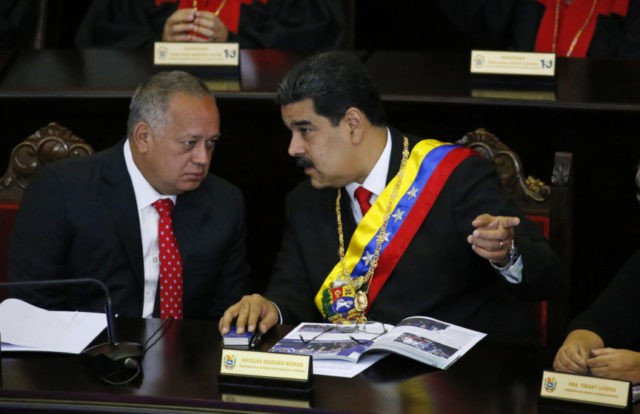Diosdado Cabello, considered second in command to Nicolás Maduro in Venezuela’s dictatorship, has begun a “witch hunt” against those who oppose Maduro after being left out of contingency plans to abandon Maduro by other regime insiders, according to a report Saturday by the Spanish newspaper ABC.
ABC, a conservative publication, has consistently broken news exposing the inner workings of Venezuela’s socialist dictatorship. One of its top correspondents, Emili Blasco, revealed the regime’s secret relationship with the governments of Iran and Syria – including a secret meeting between Maduro and Hassan Nasrallah, the head of Hezbollah – in his book Boomerang Chávez.
The newspaper reports this time, citing unnamed sources, that Cabello has tasked the nation’s Supreme Court with prosecuting as many Venezuelans as possible involved in activity to remove Maduro from power, including those within Maduro’s government. Cabello is the head of the “national constituent assembly,” a body Maduro fabricated to illegally replace the opposition-held National Assembly. Like most in the highest levels of Venezuelan power under Maduro, he has held a rotating set of titles and his powers are ill-defined within the law.
Cabello also hosts a television show, Con el mazo dando (Hitting with the Mallet), where he routinely threatens his enemies.
“Negotiations between high-ranking Venezuelan officials and the United States, which overflowed into the movement begun on April 30, excluded Cabello, one of Venezuela’s strongmen, which produced a great fracture in the chavista ranks,” ABC reported. The source called the failure to consult Cabello in contingency plans to remove Maduro “a great mistake by the regime” that has empowered him to exact his revenge on anyone who threatens his power.
Maduro ceased to be the legal president of Venezuela in January when his term expired. He claims the presidency based on an election last May widely considered fraudulent by the international community in which he banned non-communist candidates and used force to threaten civilians to vote for him. Despite his efforts, the election boasted record low turnout, another reason over 95 percent of Venezuelans do not consider him their president. The National Assembly, the last remaining democratically elected body in the federal government, used its constitutional power to replace Maduro with President Juan Guaidó in January.
On April 30, Guaidó appeared at an air force base at dawn asserting that he had finally secured control of the military, as the Venezuelan constitution demands, and Maduro would now be forced to leave the presidential palace. He urged Venezuelan civilians to flood the nation’s military bases and support opposition soldiers against regime loyalists. Maduro responded to the plan with violent repression, killing seven and injuring nearly 200 using armored vehicles to run people over and shooting all seven dead. Among the dead were 14-, 15- and 16-year-old teens.
Maduro appeared on television and insisted that no one in his inner circle had, as Guaidó claimed, had conversations with American officials to have sanctions lifted on this and to avoid prosecution following their betrayal of the dictator. Among those appearing alongside him were those that National Security Advisor John Bolton had implied were in talks to defect: Defense Secretary and head of the armed forces Vladimir Padrino López, Supreme Court chief judge Maikel Moreno, and presidential guard commander Ivan Rafael Hernandez Dala.
ABC claims that reports of their plans to abandon Maduro were true, and that the plotters had left Cabello out of their scheme. The only high-profile Maduro loyalist to defect so far was the head of the Bolivarian Intelligence Agency (Sebin), the secret police tasked with torturing and disappearing political dissidents. Maduro rapidly replaced Gen. Manuel Ricardo Cristopher Figuera with his predecessor Gustavo González López who, according to ABC, is a Cabello loyalist, leaving the latter more empowered than possibly ever during his tenure in the regime. The claim that Cabello is also ordering the Supreme Court to enact mass prosecutions suggests that Maduro expanded his authority over Moreno, suspected of planning to abandon Maduro and changing his mind at the last minute.
ABC described Cabello’s campaign against suspected traitors and opposition figures as a “witch hunt.” The Supreme Court has allowed prosecutors to pursue cases against at least eight National Assembly members and counting. In the case of Edgar Zambrano, Guaidó’s second-in-command when he was president of the National Assembly, Sebin forces used a tow truck to arrested Zambrano after he refused to get out of his car. Zambrano’s, and his car’s, whereabouts remain unknown at press time.
Reports last week indicated that Maduro, in response to Guaidó’s move to control the military, has become increasingly concerned about the loyalty of those around him, even subjecting his closest confidantes to polygraph tests and asking if they had plotted against him. Prior to the event, reports had already begun to circulate claiming Maduro no longer trusted the Venezuelan military and kept Cuban soldiers around him at all times.
Diosdado Cabello has long been one of Maduro’s closest confidantes, a former soldier with the loyalty of the military. Multiple reports over the past decade have identified Cabello as the head of the Cartel de los Soles, an intercontinental cocaine trafficking criminal syndicate run through the Venezuelan military. Last year, Cabello sued the Wall Street Journal for reporting on his drug ties but lost the suit due to the overwhelming evidence of his involvement in drug trafficking.

COMMENTS
Please let us know if you're having issues with commenting.